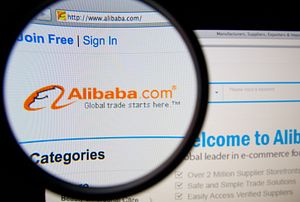Chinese online retail giant Alibaba Group Holding set the price for its initial public offering (IPO) on Thursday at $68, with its shares set to start trading on the New York Stock Exchange on Friday. The IPO raised $21.8 billion, which could rise to $25.02 billion if all additional demand options are exercised, making it the largest IPO in history. The implications of such an enormous surge in capital for the company that still makes most of its money in China are important. The IPO essentially allows for two things: Outside investors to get a larger piece of China’s exploding online retail market, while Alibaba gains the capital necessary to make a substantial foray outside its domestic market, most likely in the U.S.
Founder Jack Ma’s company will now be the most valuable online retailer in the world, with a valuation of $167.6 billion compared to Amazon’s $150.2 billion. It will also enjoy greater potential for profit due to its low cost structure, since Alibaba simply acts as a transactional intermediary that doesn’t incur shipping or warehousing costs, unlike Amazon. This difference in structure is part of the reason that despite Amazon’s sales reaching $74.5 billion last year, its profit was just $274 million, while Alibaba’s margins were much better at $8.6 billion in sales and $3.76 billion in profit, according to Bloomberg.
Ma’s company is now poised to use this new pool of capital and Alibaba’s dominant position in China to move abroad. The fact that 88 percent of Americans have never heard of Alibaba, according to Reuters, means there is huge potential for growth if it can successfully brand and market itself. However, competing with established retailers like Amazon and eBay will not be easy, especially in the short-term. To do that, Alibaba announced plans for a U.S. version of its online service called 11 Main, which is still being developed.
While Alibaba is set to become an immediate corporate heavyweight on the scale of Facebook or Google, according to e-commerce software provider ChannelAdvisor’s CEO Scot Wingo, there are still potential downsides for investors beyond the normal risks associated with the stock market. Writing in the New York Times, Harvard law School’s program director on corporate governance Lucian Bebchuk warns that despite the IPO, the corporate structure of Alibaba allows for control “to be locked forever in the hands of a group of insiders known as the Alibaba Partnership. These are all managers in the Alibaba Group or related companies. The Partnership will have the exclusive right to nominate candidates for a majority of the board seats,” despite only holding a small percentage of the company’s equity capital. This type of structure could allow the board to make deals that are beneficial to companies that these members have a substantial stake in, but that might be unfavorable to Alibaba.
China’s regulatory environment also does not require Alibaba to be as transparent as most companies listed on U.S. stock exchanges need to be, and U.S. Senate Finance Committee member Robert Casey warned on September 8 that not enough had been done by regulators to protect investors from the nebulous corporate structure of companies like Alibaba.

































